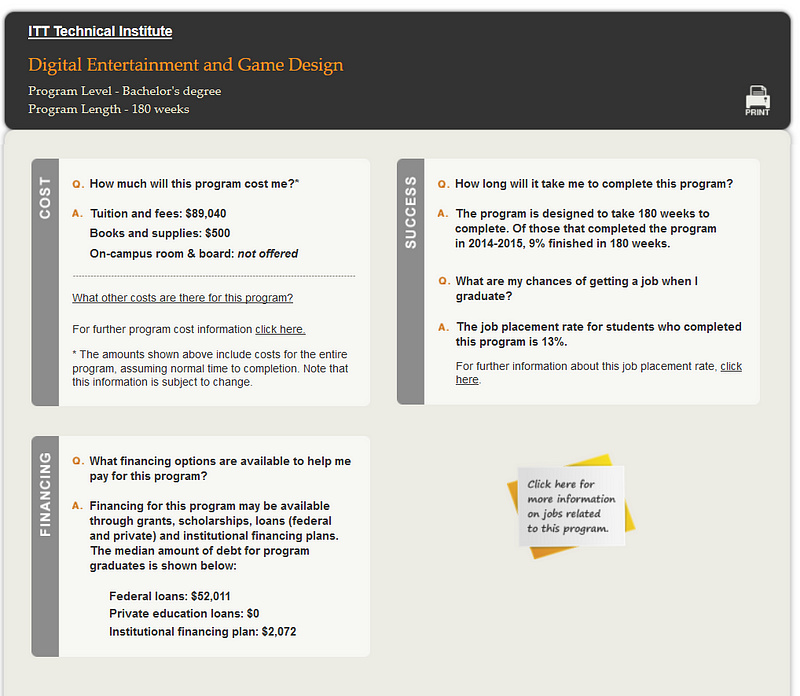Debt Man Walking
The Trials and Tribulations of ITT Tech for-profit survivors.
At times in your adulthood, life asks of you to make decisions that can drastically change the trajectory of your existence. These are decisions that can have consequences depending on your choice, and can not be easily undone or outrun.
Should I take a job that pays well, but will afford me little time with my family? Should I marry my partner, whom I love, but has flaws that could lead to some serious conflicts in the future? Should I place my faith in a religion that welcomes some in my life, but tells me other will pay the ultimate price for who they are as human beings? Choose incorrectly, and these decisions can follow you for the rest of your life.
Pursuing higher education to provide a better existence for yourself and your loved ones should never be a decision that punishes you for choosing it.
I made the decision to pursue higher education. I chose to obtain my education through ITT Tech. It is a decision that has dogged my entire adult life. My name is Daniel Venegas, and I am one of hundreds of thousands of former for profit students who was scammed by a for-profit ‘college.’
When I was 18, I graduated high school and became disillusioned with the path higher education requires in order to have the career of my dreams. I loved playing video games since I was kid, and wanted to learn how to create something in this wonderfully engaging medium. But why should I have to take more history and math classes in college if they had nothing to do with my major? I thought it was a waste of time and resources to do it this way, so I looked for a more direct path to achieving my goal.
That’s when I came upon ITT Tech. Their advertisements flashed across the screen with promises of success and a direct route to getting you in the field you wanted to be a part of. I was 18 and starry-eyed — how could I say no to that? So, I went to my local recruitment office, which should have been a dead giveaway, to see what they had to offer.
I met with my recruiter…sorry, I mean ‘counselor,’ to discuss the programs offered by ITT Tech. I told him I wanted to learn how to make games. He said that was perfect and that they had the perfect program for me. He told me their visual design program would be perfect for me and that I would be making games in no time.
What’s that old adage, “If it is to good to be true, then it probably is?” I should have believed it. But instead, I chose to believe my recruiter when he told me some of the people he recruited went on to work for companies like EA and Activision. Present day me would have asked what position they hold at those companies (that sentence will make sense in a bit), but 18-year-old, green-behind-the ears me was wooed by the video game publisher name dropping and promises of a lean and expedited route to my career.
If my father wasn’t there to tell me to hold off on signing the loan papers that first day, I would have caved to my recruiters incessant pressure to sign on the dotted line right then and there. He told me to think about what brought me to his recruitment office in the first place and that ITT was the right place to get my degree. I decided to listen to my dad, so we went home. I took the night to think it over, but didn’t change my mind. I was back at the office the next morning, signing up for private and federal loans to reach my dreams. I mean, what was there to think about? I could be working at EA or Activision some day.
While I attended, I worked hard learning the Adobe Suite. Everything was going well until I and other students, who were there to learn game design, began speaking with our teachers.
A few of my teachers gave me a confused looks when I told them my aspirations. I tried not to let it discourage me, but it was hard when I kept getting that response. It wasn’t until I spoke with my rapid visualization teacher that I realized the error my classmates and I had made.
He was actively pursuing a career in game design, and was working at ITT until he was hired by a developer. He got his education from an actual university. We told him that we were here for game design, and he confirmed our worst fears. He told me and other students here for game design that we had made a huge mistake. This school, let alone this program, was not teaching us the things we needed to learn to get a career in game design. He said the curriculum was bullshit and that we needed to look elsewhere if wanted a career in game design.
I couldn’t ignore the signs anymore. Hearing a teacher tell me that I signed my money and education away to a lie was a punch to the gut. I took out loans for tens of thousands of dollars, all for a program that wasn’t for game design. I felt like an astronaut piloting a ship to Mars, only to get a call from NASA mid-flight, telling me that my space ship was built to only go to the moon. I was so scared and unbelievably angry.
This forced me to take a second look at my curriculum completed thus far:
Semester 1: Problem Solving, Strategies for the Technical Profession, Introduction to Design (Adobe Suite)
Semester 2: College Mathematics, Instructional Design, Typography
Semester 3: Rapid Visualization, Composition I, Digital Type and Image Manipulation (Adobe Suite)
Semester 4: Composition II, Audio Visual Techniques, Graphic Design Production Process (Adobe Suite)
Semester 5: Group Dynamics, Modeling in 3D (3D Max), Interactive Communication Design
Of all the programs listed, only one of those had anything remotely to do with game design. I was over half way through my program and had only taken one class about game design. How could this be? My recruiter told me this program would teach me how to design games, not graphic design.
I since learned that many ITT students are encouraged to take the Visual Desgin associates degree program before undertaking the bachelors Game Design program. This makes no sense as the curriculum is unrelated. Visual design teaches you how to design ads and logos, not video games.
My recruiter made no mention that this was only the first part of the whole program and that there was another program I would have to attend to actually learn the game design part. At that point, I was already $20,000 dollars in debt and disheartened that all that money went toward a program that had nothing to do with game design.
Not long after, I was diagnosed with a serious mental illness that forced me to withdraw from the program. It took me a couple of years to recover from it, but by the time I was ready to come back, I had no interest in finish a program that had taught me nothing I was promised when I first enrolled.
Since choosing to not finish my degree, I have spoken to many ITT graduates who told me I made the right call. All of the people I spoke with have had trouble attaining positions in their respective fields and are having a miserable time trying to pay back their loans.
Turns out this is case for the majority of ITT students. According to Higher Ed Not Debt, “ In 2011, 22% of student loan borrowers from ITT Tech defaulted on their federal student loans. In contrast, the average default rate for 4-year public institutions was 8.9%. For private student loan borrowers, ITT’s projected default rate is a whopping 64%. This is primarily because of the high tuition, low graduation rates, and low job placement.”
High tuition, low graduation, and low job placement seem to be a staple of ITT Tech. But what about the field I was pursuing?

Well, according to this graphic taken from the remnants of the ITT website itself, the program I wanted to pursue was no better. The graduation rates are abysmal. And with a tuition of $89,000 and only a 13 percent chance of job placement, you can see why I decided to hit the eject button and not complete the program. Sure, I’m in debt $40,000 now, but that is less than half of what I would owe private banks and the federal government for a fraudulent education that ill prepares its student for a career.
I mean, it makes sense when according to that same Higher Ed Not Debt article, a senate investigation committee found “that in one year ITT Tech spent $252 million on marketing (that’s more than they spent on instructing their students).”
But for argument’s sake, lets say I did complete the program and entered the workforce. What kind of job could I expect from the degree I would have earned?

Wait! Let me get this straight: most recent grads from this program got jobs as a video editor, a graphic design assistant, and a gaming consultant? The first two positions have nothing to do with game design. These are graphic design positions. Oh, that’s right! ITT recruiters funnel students through their $40,000 Visual Communications program before they take the game design program.
As for the gaming consultant? According to an article published on Kotaku about game consultants, “A consultant is someone who provides expert advice professionally for a fee. Specifically, a game consultant’s job is to provide insights and recommendations that help game companies improve their products’ chances for success.”
So essentially, they are independent contractors who help troubleshoot issues a developer and or publisher may run into with their game. They are not themselves designing the video games. Rather, they are merely assisting with issues that come up during development like trade show support, messaging and positioning, and mock reviews.
Are these the graduates my recruiter was boasting about who make games at EA and Activision, when pressing me to sign my loans immediately? Were they, in fact, working at these companies not as game designers, but in marketing positions? I’m sure those grads are happy to be working at the company of their dreams in a completely unrelated division to the game design degree they earned, making a median income of less than half of what they owe ITT Tech, I mean, the banks and the Department of Education now, for said degree.
When you are 18, you are expected to make stupid decisions. I can’t believe that trying to get a degree in the field that I dreamed of working in was mine. I wish I had known what due diligence was at the time, but I was young and impressionable like everyone is at that age. When a primarily federal-funded school offered me a straight path to my career, how could I say no? The Department of Education is supposed to be looking out for me, right? Right?
I may be ‘lucky’ to have realized sooner than others that this was a scam, but not by much. As I mentioned earlier, I still owe $40,000 in loans to private banks and the Department of Education. The momentum of my life has been held back because of ITT Tech. I am scared for my future and what it means for me. I’m currently attending a community college and am scared to transfer to a university because I would add more debt to my already high outstanding loans. You don’t add more water to a ship that is sinking. That isn’t how you get out of debt. I’m scared to settle down with someone because my debt to asset ratio would prevent me from purchasing a home or contribute financially. My life is in limbo, and the future looks bleak.
The worst part of this whole thing is that I am only one of the hundreds of thousands of people who are in this position.
Gary Loken is military vet who was looking to do something with his life after serving in the military. After his service was up in 2004, he decided to chase his passion for video games and enroll in the ITT Tech’s game design program.
Graduates like Loken were the examples my recruiter used to show how I could work for a prominent game publisher if I attended ITT Tech.
“I always had a thing for making things and taking things apart,” Loken said. “I just wanted to figure out how videos games are made and to see if I could get into the industry. I did some research trying to find some schools. And of course ITT Tech had their commercial at the time that said ‘we teach game design.’ I was like, ‘Well, lets give it shot.”
He attended classes from 2004 through 2009 in New Orleans, Louisiana. During his time there, he got his associate degree in visual communications (!) and went on to earn his bachelor’s in game design. What is usually a four year program, took him a little longer due to Hurricane Katrina hitting New Orleans in 2005. After he got out of his lease, he relocated to Little Rock, Arkansas to continue his education.
While attending ITT, Loken also saw signs that his school wasn’t all that it was cracked up to be. Loken settled on Little Rock because there was a professor there who worked for Activision for several years. That professor left after half a semester.
Then, there was the professor associate who Loken said breached the Family Education Rights and Privacy Act. “I was in a portfolio class with my classmates and several other people including my wife, who went to ITT Tech for programming. Half way through the quarter, everybody is failing. She said we didn’t turn in all of our paperwork. I turn in my assignment, and the next week she said it would be on our grade sheet. Come to find out she was handing of our work to her friend to grade her work,” Loken said.
Loken also explained that his professors weren’t always the most qualified educators. He recounted a class where his teacher was a former student who had just graduated from the game design program, and was hired to teach a 3d modeling class, using the Autodesk Maya software, in that very same program.
“The first day, she hands out the syllabus and goes, ‘Here is the syllabus. I don’t know Maya. Figure it out, Google it,’” Loken said.
These incidents were just the tip of the iceberg. He was also forced to bring his own computer to complete his final project because the computers on campus were out of date. When he asked the deans to update their hardware to run standard software used in the industry, the dean told him to, “Not make their project so complicated. Regardless, Loken powered through and graduated the program.
After graduation, Loken was forced to work at Papa John’s Pizza and Chuck E. Cheese’s due to his inability to find work with his degree. When he finally went to career services at ITT Tech, they were able to find him a job as a web programmer. His degree did not teach him web programming, and was subsequently fired a month and a half later.
Soon after, Loken moved to Austin, Texas. He joined a Facebook group called The International Autodesk Animation User Group Association — Austin Chapter. The group meets monthly to connect digital artists with other people in that industry. Loken met a professor from Austin Community College and decided to show him some of the models he had made.
“He goes, ‘How did they teach you how to model?’ I said box modeling. He asked me what school I went to, and I told him ITT Tech. Then, he goes, ‘Do me a favor, and forget everything you have ever learned about modeling.’”
Loken has since found a job at Blizzard Entertainment, one of the premier publishers in the video game industry. He works there as a Customer Service Representative. “I don’t need a degree for what I do. I do customer support and a high school graduate can do my job,” Loken said.
ITT Tech promised Loken, just as they had promised me, that if he went to their school, they would give him the tools needed to achieve his dreams and improve his life.
“The whole reason I went to school was to live the American dream. You know, the house, the kids, no debt. And now I’m facing $87,000 in debt, because of this school,” Loken said.
This is no accident. ITT Tech has a reputation of under preparing its students for the careers they pay for and preying on the dreams and vulnerability of potential students. That same Senate report mentioned earlier uncovered disturbing recruitment tactics.
In the document, investigators found that recruiters used a prospective student’s displeasure with their life and pain experienced to encourage them to enroll.
“One pervasive sales technique employed by ITT is to manipulate a prospective student’s emotions as a strategy to sell an enrollment contract. One ITT recruiting manager explained that a recruiter must “dig in and get to the pain of each and every prospective student.” He added, “By getting to the pain, the representatives will be able to solidify the appointments and have a better show rate for the actual conducts.”
They also had a chart called the pain funnel that showed the levels of pain a recruiter could use to get to the bottom of a potential student.

After this document was exposed, the recruiter who wrote it defended the practice by saying ITT payed her to go to this conference and adapt this technique to ITT Tech’s recruitment culture. She went on to say, “In addition, at quarterly district meetings I did pain funnel training for nearly every top recruitment representative, financial aid coordinator, dean, instructor, department chairs, all functional managers, all college directors and the district manager for the entire Southern California District, the largest district in the country. The presentation material was also given out to over 100 ITT Tech employees throughout every department in the district.”
Hey, the ITT campus I was recruited in was in that district.
I wish I could end the story here and say that we were the only ones ripped off, but the truth is there is thousands of us out there.
Bob Brugge is another former ITT product who is struggling with life post ITT Tech. In 2001, he suffered an industrial accident that ruined his shoulder and forced him to leave his job and find a new profession. He drove trucks for a while, but his injury began affecting his ability to drive trucks. So, he decided to attend ITT Tech after seeing the commercials on TV all the time.
He was enrolled at ITT Tech from 2008 to 2013. During his time there, he received and associate degree in drafting and design, and a bachelor’s in project management. Problem was, he wanted a bachelor’s in construction management.
During his final semester for his associate program, the ITT he was attending stopped accepting students into the construction management program. His counselor suggested Brugge enroll in the project management program, leading him to believe they were virtually the same degree.
“They led me to believe that there was a lot of crossover between construction management and project management, even though project management is considered an IT course. Well, the things that didn’t cross over were the things that may or may not have helped me. I got ripped off man,” Brugge said.
According to the ITT web page that details the project management degree, “This program involves the study of the theory and techniques that can be used by a project management professional to practice in a digital global environment. The techniques studied include how to initiate, plan, organize, staff, guide, monitor and control a project through an integrated process to meet identified requirements on time and on budget.”
The construction management web page states, “ Construction Management is the study of the management and technological aspects of residential and commercial construction projects. Construction managers apply management techniques to the planning, design and construction of a project in order to control the time and cost to complete the project and the quality of the construction.”
Not quite the same thing. This led to issues for Brugge after graduation. Career Services used to update him about the jobs available to him. He opted out of them because every single job opening required the applicant to have experience that he did not receive from ITT Tech. All of these jobs were simply out of his reach with the education he received from ITT Tech.
Brugge now owes $85,000 in student loans, and doesn’t have a credible degree to show for it. “I spent a lot of time working on that bachelor’s degree. Now, I have a valid bachelor’s degree from a school that was closed for fraud,” Brugge said.
He has filed a defense to repayment application in the hopes of having his debt forgiven. Brugge has a Go Fund Me page to help him with upcoming school expenses and currently works a part time job while he waits to attend the University of Montana this coming spring. If his defense to repayment is accepted, it will wipe all but $20,000 of his debt. But the way he sees it, at least he will have a chance to get the proper education he so badly wanted in the first place.
Many students also have private loans to worry about, on top of their federal loans. The Defense to Repayment program only covers federal loans not student loans.
“Let’s say I come out of college owing 100 grand, plus 20 grand in private loans. Well, at least I have a chance to get a job in my field and pay those things off. If I have 20 grand worth of bad loans, that’s fine. I’ll be happy to pay them off if I can just get a job that’s not working at McDonald’s or the gas station up the street,” Brugge said.
As we all know by now, ITT Tech has since closed and filed for bankruptcy after the Department of Education forbade the enrollment of students who use government financial aid or grants to pay for classes, as well as being mandated to increase their reserves to $153 million to pay for all the impending lawsuits to be filled against them.
That same Senate Committee investigation found that, “In 2010, ITT reported 60.8 percent of revenue from title IV federal student aid programs. However, this amount does not include revenue received from the Department of Defense and Veterans Affairs education programs.” With that much coming from students grants and loans, it is no wonder that ITT Tech shut its doors a week or two later.
Meanwhile, employees and shareholders made out with all the profits they accumulated over the past decades while the students were left holding the bill.
Students who were attending ITT when the government shut it down were given the option to transfer their credits to the few colleges who would accept them or have their loans forgiven. For veterans like Loken, all their money was spent from their GI bills to pay for ITT Tech. There is no way for them to get that back.
Other students, like me, who dropped out before they graduated realizing they were being scammed, or graduates who earned useless diplomas from ITT before their closure, don’t have many options.
Some have decided to stop paying their student loans in protest to being defrauded by ITT Tech. They are called The Debt Collective, and they hope to send a message to creditors and policy makers that they will not pay for being defrauded. They face heavy penalties if they don’t pay, but they are choosing to do it to raise awareness for our cause, as well as pressuring the Department of Education to erase their debt from this fraudulent school. While effective in numbers, the penalties can be to severe for some. For others, it is just simply not an option.
“I worked my ass off to get my credit score to where it is at. I don’t want to just say, ‘Screw it,’ and not pay them because that will ruin my credit score,” Loken said. “And without a good credit score, you can’t find an apartment, you can’t get a car, etc. So, I’m doing the best I can to make ends meet. And sometimes, it’s either: A) pay the rent and I’ll have food, or B) have food and not be able to pay rent.”
Most former students are applying for a program called Borrowers Defense to Repayment, which allows students who feel like they were defrauded by a school to apply to have their loans forgiven on the basis that they were scammed.
A Facebook group called the ITT Tech Warriors is offering support and information for all former ITT Tech students who are in this situation. It is a private group, but they will be happy to allow anyone who is affected by this crisis in and be there to help and support one another.
Groups like the ITT Tech Warriors and Debt Collective are more important now than ever. The situation has only gotten worse since President Trump himself ran a for profit college that was sued for defrauding its students. He had to settle out of court so that he didn’t have to call it ‘fraudulent.’ It is hard to see him have any sympathy for defrauded ITT Tech students. Not to mention Trumps head of the Department of Education, Betsy DeVos, is staffing her department with people from the the for profit sector. For people like myself, our future looks bleak.
The thing is, many of us don’t just want a free pass. Interviewing these students and speaking with countless others in the same position, we all echo the sentiment that we want to go back to school. We want to build lives for ourselves. We want to be educated so that we can pursue our careers and make our lives better. It’s the same desire that lead us to ITT Tech in the first place. The only difference, now, is that a company took advantage of that desire and now there is an insurmountable wall of debt stopping us from chasing that dream. We are not asking for a get out of jail free card after being scammed from yet another defunct, fraudulent for-profit college. What we are asking for is a chance to be able to get a proper education, just like everyone else.








